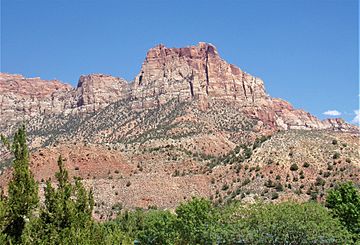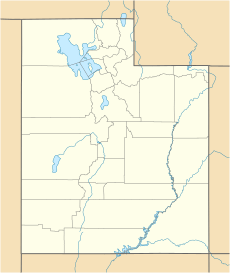Johnson Mountain (Utah) facts for kids
Quick facts for kids Johnson Mountain |
|
|---|---|

Johnson Mountain, southwest aspect
|
|
| Highest point | |
| Elevation | 6,106 ft (1,861 m) |
| Prominence | 586 ft (179 m) |
| Isolation | 0.85 mi (1.37 km) |
| Parent peak | The Watchman (6,545 ft) |
| Geography | |
| Location | Zion National Park Washington County, Utah United States |
| Parent range | Colorado Plateau |
| Topo map | USGS Springdale East |
| Geology | |
| Age of rock | Jurassic |
| Type of rock | Navajo sandstone |
| Climbing | |
| Easiest route | class 4 scrambling |
Johnson Mountain is a tall peak, about 6,106 feet (1,861 meters) high. It is made of a type of rock called Navajo Sandstone. This mountain is located in Zion National Park in southwest Utah, United States. It is a well-known landmark in the park.
About Johnson Mountain
Johnson Mountain stands right southeast of Springdale. It rises about 2,200 feet (670 meters) above the town. It also towers over the floor of Zion Canyon. The mountain is located between the North and East Forks of the Virgin River. These river forks help drain water from the mountain.
The closest taller peak is The Watchman. It is about 0.8 miles (1.3 km) to the north-northeast. Mount Kinesava is about 2.94 miles (4.73 km) away, directly across the canyon to the northwest. Shunesburg Mountain is about 2 miles (3.2 km) to the southeast. It sits across the entrance of Parunuweap Canyon.
The name "Johnson Mountain" was officially chosen in 1934. It was named after Nephi Johnson (1833–1919). He was a Mormon missionary, an interpreter, and an explorer. He was also the first white person to visit Zion Canyon. In 1858, a Paiute guide named Nauguts led Nephi into the Zion Canyon area. Johnson wrote a good report about how useful the upper Virgin River basin could be for farming. He later helped start the town of Virgin in that area.
Mountain Climate
The best times to visit Johnson Mountain are during spring and fall. The mountain is in a Cold semi-arid climate zone. This means the coldest month usually has an average temperature below 32 °F (0 °C). Also, at least half of the yearly rain happens in spring and summer.
This desert climate gets less than 10 inches (250 mm) of rain each year. Snowfall is usually light during the winter months.
Gallery
 | Lonnie Johnson |
 | Granville Woods |
 | Lewis Howard Latimer |
 | James West |









